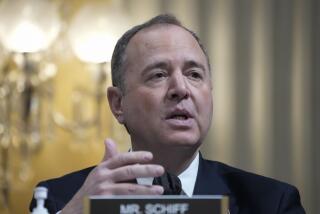Don’t politicize FBI pick, lawmakers urge Trump (and hand over any tapes, they add)
Lawmakers from both sides of the political divide cautioned President Trump on Sunday not to name a political figure to head the FBI, and a growing chorus declared that if the president has tapes of White House conversations with fired Director James B. Comey, they must be handed over.
With Trump promising to move swiftly to name a new FBI chief, bipartisan support swelled for finding a respected, nonpolitical leader for the bureau as a means of turning down the temperature on what has become a highly fraught investigation of Russian election-meddling.
At the same time, the president faced calls from Democrats and Republicans to clarify what he meant when he hinted, via Twitter, that he might have taped conversations with the dismissed director. The president claimed separately that Comey had reassured him he was not under investigation — a version of events contested by associates of the fired FBI chief.
Trump spent a cool, sunny Sunday at one of his golf clubs in Virginia — his 24th visit to one of his golf properties in the 16 weeks since he took the oath of office, according to Mark Knoller of CBS, the press corps’ unofficial keeper of such records. The White House said the president was making calls and “may hit a few balls.”
But a gathering tempest awaited him back in Washington. Democrats said they may try to block Trump’s FBI nominee, whoever it might be, in order to force the appointment of a special counsel to oversee the Russia inquiry.
Some observers pointed to widening and corrosive implications of the Comey firing and the events leading up to it. Former Director of National Intelligence James R. Clapper, speaking on ABC’s “This Week,” said the Kremlin’s interference with the presidential election was intended to sow “doubt, discord and dissension” in the U.S.
“The Russians have to be celebrating, with a minimal expenditure of resources, what they have accomplished,” Clapper said. In a second interview, on CNN’s “State of the Union,” he said American institutions were under assault internally as well.
“Internally, by the president?” interviewer Jake Tapper asked.
“Exactly,” Clapper replied, citing an “eroding” system of checks and balances among the three branches of the U.S. government.
At least eight candidates have been interviewed for the FBI post that was vacated when Trump abruptly fired Comey last week. The president, who is scheduled to leave the U.S. on Friday for his first international trip as president, said it was possible he might make a “fast decision” and unveil a choice before he departs.
One leading contender has been Sen. John Cornyn (R-Texas), but a senior GOP colleague, Sen. Lindsey Graham (R-S.C), warned against picking any elected official because the issues surrounding the appointment are so highly charged.
“John Cornyn, under normal circumstances, would be a superb choice to be FBI director, but these are not normal circumstances,” Graham said Sunday on NBC’s “Meet the Press.”
In the interview, Graham was critical of the bewildering succession of White House explanations for the firing, which first centered on Comey’s handling last year of the investigation into Hillary Clinton’s use of a private email server during her tenure as secretary of State.
After offering versions of that explanation on Tuesday and Wednesday, the White House abruptly shifted stories on Thursday when Trump, in an interview with Lester Holt of NBC, said that “this Russia thing” had been on his mind when he decided to fire Comey and that he had made up his mind on the issue before hearing any recommendation from Justice Department officials.
“The president has a chance to clean up the mess that he mostly created,” Graham said Sunday.
Senate confirmations of FBI directors, who serve a 10-year term and are supposed to remain above the political fray, are normally a matter of bipartisan consensus. Comey, who was four years into his term when he was fired, had been confirmed 93-1.
This time around, though, the contest could be much more tightly fought. The Republicans, with 52 seats, control the 100-member Senate. But if even three of them defect and refuse to support Trump’s choice for a Comey replacement, the nomination would fail. As a result, Graham’s opposition to naming any elected official would make the choice of Cornyn risky.
Democrats have raised a sustained outcry over the dismissal of the FBI chief, who was in charge of a far-ranging counterintelligence investigation into Russian meddling in the U.S. election and possible collusion by associates of Trump. Critics characterize Comey’s ouster as a likely effort to impede that inquiry.
Interviewed on CNN’s “State of the Nation,” the Senate’s top Democrat, Sen. Charles E. Schumer of New York, said his party might seek to block approval of Trump’s nominee unless a special counsel was appointed to investigate Russian interference.
“I think there are a lot of Democrats who feel that way,” Schumer said. “We have to discuss it as a caucus, but I would support that move.”
Seizing on a confounding spinoff from the Comey firing, Schumer and other senior Democrats continued to demand clarity from the White House on whether Trump recorded conversations he had with the FBI director this year.
“If there are tapes, the president should turn them over immediately” to congressional investigators, Schumer said, adding, “To destroy them would be a violation of law.”
Graham and other senators made similar remarks.
The president tweeted on Friday that Comey “better hope that there are no ‘tapes’ of our conversations.” White House Press Secretary Sean Spicer on Friday repeatedly declined to clarify whether such tapes exist.
In his dismissal letter to Comey, Trump claimed Comey informed him on three occasions that he was not under investigation — once at a private dinner and twice in phone conversations, he later said in the interview with Holt.
Comey associates have cast strong doubt on that account, saying the president had sought to extract pledges of loyalty from the FBI chief.
The senior Democrat on the Senate Intelligence Committee, Sen. Mark R. Warner (D-Va.), said the question of the tapes “sure seems to have reverberations of past history” — apparently referring to Richard Nixon, who was forced to resign as president over the Watergate scandal.
“When we’ve seen presidents who secretly tape, that usually does not end up being a good outcome” for them, Warner said on “Fox News Sunday.”
If Trump-Comey tapes do exist, he said, “I want to make sure, one, they’re preserved and not mysteriously destroyed in the coming days, and then two … Congress will have to get a look at those tapes.”
In a departure from previous practice when there are major political events in Washington, the White House did not send senior aides to make appearances on the political talk shows to explain the rationale behind the Comey firing.
The exception was Secretary of State Rex Tillerson, who was asked in an appearance on NBC’s “Meet the Press” whether he felt his own independence was threatened by a scenario like the removal of the FBI chief.
“I have a great relationship with the president,” he said. “I understand what his objectives are. When I’m not clear on what his objectives are, we talk about it.”
ALSO
After a week of self-inflicted chaos, Trump could see long-term costs to his presidency
For political street fighter Nancy Pelosi, there’s new power in opposing Trump
More to Read
Start your day right
Sign up for Essential California for news, features and recommendations from the L.A. Times and beyond in your inbox six days a week.
You may occasionally receive promotional content from the Los Angeles Times.





